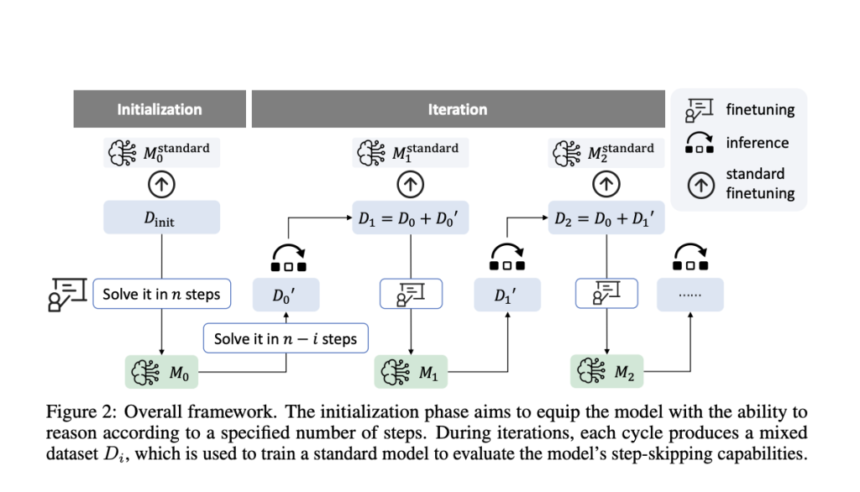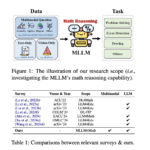

The pursuit of enhancing artificial intelligence (AI) capabilities is significantly influenced by human intelligence, particularly in reasoning and problem-solving. Researchers aim to create language models that emulate human-like behaviors, such as optimizing reasoning processes. This involves exploring how models can transition from detailed, step-by-step solutions to more efficient methods by selectively skipping steps, a hallmark of human expertise. These advancements contribute to achieving artificial general intelligence (AGI) with improved efficiency and task-solving capabilities.
A key challenge in AI is the models’ inability to replicate humans’ selective approach to skipping redundant steps during problem-solving. Humans develop this skill through practice, which allows them to reduce cognitive effort and focus on more complex aspects of a problem. Current language models lack this ability, adhering strictly to detailed processes even when simpler, equally effective solutions exist. Developing models incorporating such step-skipping behavior can enhance their efficiency and generalization abilities across various tasks.
Traditional training methods for language models involve step-by-step reasoning, relying on detailed datasets. Techniques such as chain-of-thought prompting encourage sequential solutions but do not address step skipping. As a result, while these models excel in solving problems comprehensively, they fail to demonstrate the efficiency observed in human experts. This limitation presents an opportunity to refine model training approaches to integrate more flexible reasoning capabilities.
Researchers from institutions like Fudan University, UC Santa Barbara, Shanghai AI Laboratory, Westlake University, and Amazon AWS AI developed a novel framework to address this. This approach introduces controlled training environments where models are guided to generate solutions with fewer steps without compromising accuracy. The method emphasizes training models on datasets combining complete and skipped reasoning paths, enabling them to learn efficient and accurate shortcuts.
The training framework comprises two main phases: initialization and iteration. The model is trained on a dataset containing comprehensive, step-by-step reasoning solutions during initialization. This establishes a foundational understanding of problem-solving. In the iteration phase, models are guided to generate shorter reasoning paths by reducing the number of steps in their responses. These shorter paths, verified for accuracy, are mixed with full-step solutions to create expanded datasets. Each iteration refines the model’s ability to identify and skip redundant steps, gradually improving efficiency. For instance, in tasks involving algebraic analogies, multi-digit arithmetic, and directional reasoning, the researchers generated datasets with detailed steps and selectively omitted certain steps to simulate human-like efficiency. These iterations allow the models to self-generate skipping data, refining their reasoning processes.
Empirical evaluations demonstrated the effectiveness of this approach across three tasks: algebraic analogies, multi-digit addition, and directional reasoning. Results highlighted that step-skipping enhanced both efficiency and generalization. For algebraic analogies, models achieved an accuracy increase of 4.76% in out-of-domain tasks, with a marked reduction in the number of reasoning steps. In multi-digit addition, performance improved by 13.91% in easier out-of-domain scenarios and by 4.75% in harder scenarios, underscoring the benefits of skipped reasoning steps. Similarly, directional reasoning tasks improved, with accuracy gains of up to 9.2% on challenging datasets. These results demonstrate that integrating skipped-step reasoning does not compromise task performance but enables models to solve problems more effectively and efficiently.
Further, the iterative training method showed that models could learn to balance accuracy and efficiency. Each iteration decreased the number of steps taken while maintaining or improving accuracy. By the fifth iteration, models consistently outperformed those trained solely on full-step datasets. This iterative refinement process also provided insights into the models’ ability to generalize to out-of-domain scenarios, suggesting that training on mixed datasets is instrumental in enhancing task-solving capabilities.
The study presents a significant advancement in equipping language models with human-like reasoning abilities. By incorporating step-skipping behavior, researchers demonstrated that models could achieve greater efficiency and maintain accuracy across diverse tasks. This approach addresses a critical limitation in existing models and opens avenues for future research on bridging the gap between human and machine reasoning. The contributions from leading institutions and companies underscore the collaborative efforts driving innovation in AI. The findings provide a promising direction for developing more efficient and versatile language models, paving the way for future advancements in artificial intelligence.
Check out the Paper. All credit for this research goes to the researchers of this project. Also, don’t forget to follow us on Twitter and join our Telegram Channel and LinkedIn Group. Don’t Forget to join our 60k+ ML SubReddit.
The post This Research from Amazon Explores Step-Skipping Frameworks: Advancing Efficiency and Human-Like Reasoning in Language Models appeared first on MarkTechPost.





 Trending: LG AI Research Releases EXAONE 3.5: Three Open-Source Bilingual Frontier AI-level Models Delivering Unmatched Instruction Following and Long Context Understanding for Global Leadership in Generative AI Excellence….
Trending: LG AI Research Releases EXAONE 3.5: Three Open-Source Bilingual Frontier AI-level Models Delivering Unmatched Instruction Following and Long Context Understanding for Global Leadership in Generative AI Excellence….

